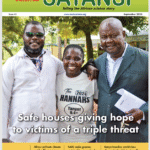For 21 years, Bamburi Nature Trail Hill, commonly known as Haller Park, has never closed its doors to visitors.
The sanctuary for lost and orphaned wildlife has been a haven for anyone who wanted to spend their day relaxing in a peaceful environment and getting acquainted with friendly animals. But when I visited recently, seeking an interview, Karima Nyinge, who heads the department for visitors, shocked me with the news. “We have closed the park for now due to the COVID-19 disease,” he said.
Haller Park was named so in honor of Dr. Rene Haller in recognition of his efforts, in conjunction with Bamburi Portland Cement Company, in transforming the abandoned quarry into a breathtaking ecological paradise.
The park is located south of the cement plant along the Mombasa-Malindi highway. It covers 75 hectares of land and houses a variety of animals, including hippos, buffalos, giraffes, waterbucks and oryx. The night walks in the park, conference services, among other activities, are now a thing of the past, thanks to the COVID-19 pandemic.
Mr. Nyinge says the government regulations to prevent the spread of the coronavirus have made it difficult for the park to operate since they host large groups per day.
“We have closed because some of the rules are hard to observe, especially because visitors like to converge around hippos and giraffes and feed them, which will see us break the rule on social distancing,” he says.
Another hurdle is contact tracing in case one of the visitors tests positive for the disease.
Mr. Nyinge says it would be difficult for them to trace all the contacts that might have come into contact with the person. He says the park receives up to 160,000 tourists a year, but this year they are likely to fall way below the number. But luckily, some of the workers were retained to continue feeding the animals and maintain their daily routine.
“The animals have been trained. For example, a hippo would come out when they are called. It’s a routine for them and we don’t want them to forget it,” says Nyinge.
The situation is not different for the Tsavo Heritage Foundation in Voi, Taita Taveta County, which champions the landscape restoration of the Tsavo Ecosystem and Dispersal Areas. Jacob Kipongoso, the Foundation CEO and environment activist, says since the first case of COVID-19 was announced in Kenya they put on hold all their plans on conserving the environment.
According to Kipongoso, most of their work involves people, hence it is difficult to uphold keeping the social distancing rule. “For now all the plans we had to plant trees here at Voi were put on hold. We have nothing to do since all the work we were supposed to do involves people,” he says.
“We were supposed to have a big meeting with environmental activists in May and an international conference in December, but both were postponed.”
Kipongoso says poachers have taken advantage of the situation to increase their poaching activities because they know there is not enough security at the sanctuary. He urges the government to provide the activists with personal protective equipment so that they continue planting trees and attain the 10 percent forest cover the State is advocating for.
Kenya Wildlife Service (KWS) Director General Brig (Rtd) John Waweru says the tourism sector has recorded a 92 percent drop in revenues since March when the first case of COVID19 was detected in the country.
The KWS boss was addressing a webinar organized by Internews in conjunction with the East African Community and World Conservation Union (IUCN) last week.
Waweru says other threats include a drop-in visitors’ numbers by 76 percent, an increase in poaching of endangered species, increased transnational crime through porous borders, escalation in bushmeat poaching and associated crime and increased human-wildlife conflicts due to influx of people in the rural areas. He says they are now planning to use technology to improve security at the parks.
“We are planning to use drowns for surveillance at the parks to stop poaching activities. We are also planning to train our rangers to be multi-skilled and offer different services at the park,” says Waweru.
While addressing the same webinar, Christophe Bazivamo, the Deputy Secretary-General for Productive and Social Sectors in the East African Community (EAC), said the region relies heavily on the abundance and diversity of wildlife to boost its economic growth, earn foreign exchange and creates jobs.
He suggests a number of interventions in the wake of the pandemic, including EAC member states providing stimulus packages for tourism small and medium enterprises (SMEs), community-based conservation initiatives, and promotion of regional and domestic tourism.
Other measures include diversifying conservation revenue streams, strengthening one health platform, and developing protected areas management plans.






